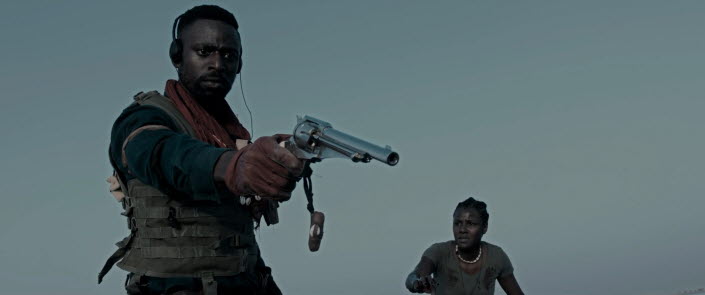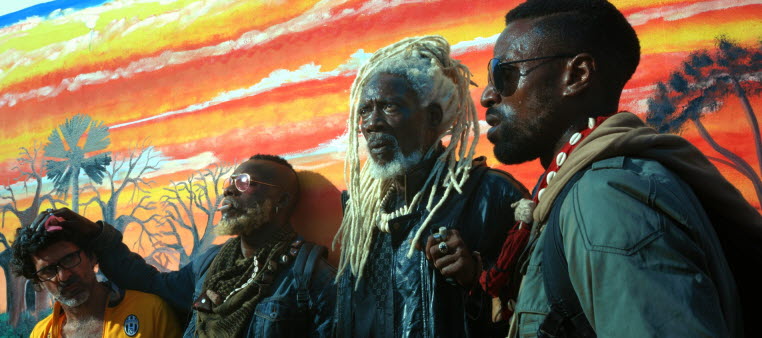Senegalese film “Saloum”, which belatedly comes to South Korea in this week via a local streaming service, is a little but competent genre film packed with goodies to be savored. Because I did not have much knowledge on what it is about or how it is about before my viewing, the movie surprised me more than once as starting from one genre area and then going into other one, and I came to admire its skillful handling of mood and details as I got engaged in its story and characters much more than expected.
With the opening narration which will resonate more with the story and characters later, the movie introduces us to a trio of mercenaries called Bangui’s Hyenas, and it throws us right into their latest mission in the middle of the 2003 coup d’état in Guinea-Bissau. Their goal is extracting a Mexican drug lord who is in a serious danger now due to his local drug business, and we are served with a striking scene where these three mercenaries swiftly move across an area strewn with numerous dead bodies on the ground before eventually reaching to where that Mexican drug lord is being held.
Once they rescue that Mexican drug lord and get a bunch of gold bricks as promised to them, everything seems to be going pretty well as they fly to Dakar, Senegal by a little airplane, but there comes a little problem. It turns out that there is a fuel leak in their airplane, so they have no choice but to land in a remote area called Saloum. For getting the fuel as well as some resin to seal the leak, they search for any place where they can get help, and, what do you know, they come to stay in a certain nearby place run by a guy named Omar (Bruno Henry), who welcomes them with genial hospitality without asking too much.
It seems that Chaka (Yann Gael) and his two colleagues can be relaxed a bit for a while in this place, but they remain watchful as before due to a couple of setbacks. First, there is a young deaf woman who quickly recognizes them, and then there comes a local police captain, who supposedly visits simply as an old friend of Omar. As the mercenaries and others including Omar gather for a dinner, everything looks and feels fine on the surface, but the mood gradually becomes tense especially when Chaka and that young dead woman have a serious conversation via sign language in front of others.
We get to know a bit more about Omar’s place and its surrounding area as everyone staying in his place are respectively assigned to do some chores outside on the next day. In case of Chaka, he happens to accompany Omar, and they soon go to a nearby fishing village. After they do a bit of shooting, they come to have a little private conversation, and Omar turns out to have some war experience just like Chaka.
It is also revealed later that Chaka has a hidden purpose behind his back. As reflected by his occasional dream scenes, he has been haunted by an old traumatic memory which seems to be associated with his deep fear of water, and now he is planning to confront the evil origin of his personal trauma. I will not go into details on that, but I can tell instead that the movie will catch you off guard when Chaka suddenly reveals something about him at one point to the surprise of everyone else around him.
So far, the movie feels like an African variation of Western genre, but, after that narrative point, it enters a very different genre, and the resulting mix will surely remind you of several works of John Carpenter. Unexpectedly finding themselves menaced by what has been hidden inside Omar’s place for years, Chaka and several others must find a way to get out of the place as soon as possible, and, fortunately, there is some possibility for their escape despite lots of risk in front of them.
I will not tell you anything about their dangerous opponent, but I can tell you that director Jean Luc Herbulot, who wrote the screenplay along with his producer Pamela Diop, and his crew members did a pretty good job of generating a palpable sense of dread along with enough amount of tension and excitement on the screen. The special effects in the film certainly look quite more modest compared to the ones in those Hollywood blockbuster films, but they are utilized effectively on the whole, and cinematographer Gregory Corandi provides a number of splendid visual moments to be appreciated. While we surely get wide and beautiful landscape shots at times, the movie does not disappoint us at all in case of its several action scenes, and the editing by Nicolas Desmaison, Alasdair McCulloch, and Sébastien Prangère is precise and succinct as delivering one dramatic impact after another. In case of the performers in the film, they all look believable in their respective roles, and Yann Gael’s strong lead performance is supported well by several other main cast members including Roger Sallah, Mentor Ba, Evelyne Ily Juhen, and Bruno Henry.
In conclusion, “Saloum” is worthwhile to watch for its deft juxtaposition of two different genres. Although I do not think I understand everything in the film as a foreign viewer, the movie still entertained me enough nonetheless, and I am definitely interested in getting to learn more about its specific background and details. This is just his second feature film after “Dealer” (2014), but Herbulot demonstrates here that he is another talented African filmmaker to watch, and it will be interesting to see what may come next from him.










